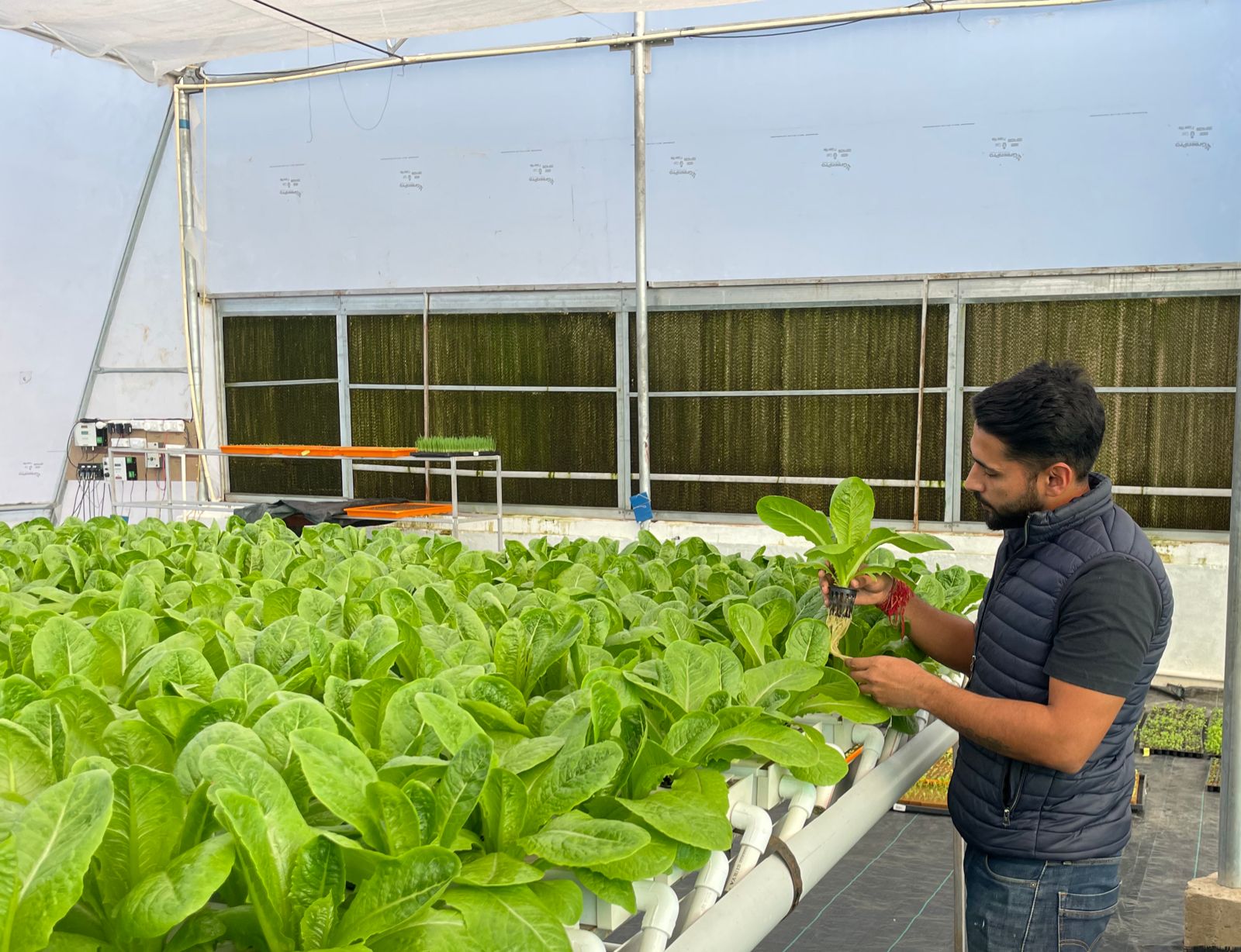An MBA graduate has scripted history by becoming a successful agripreneur by setting up the Union Territory’s first hydroponics farm at Pakkhiyan, Mishriwala in Jammu.
Saajan Gupta, 29, a resident of Roop Nagar, Jammu, completed his masters in business administration in construction management from country’s prestigious Amity University in the year 2019.
Thereafter, to begin with the career planning part during the spread of the COVID-19 pandemic, Gupta started looking for a career in modern agriculture.
“I had an interest in agriculture from quite some time and it was shocking for me to see that India being an agrarian economy was still not encouraging the use of technology to the extent it should have been done.
“Also, in those testing times of COVID pandemic, I experienced that the hospitality sector was badly hit and there was a disruption in the supply chains. That’s when a hobby became an idea and I came up with this initiative,” says Gupta.
Thereafter, he approached the Directorate of Agriculture Jammu in the year 2021 for help in setting up a hydroponics farm.
“Almost all the employees in different hierarchies at the Director Agriculture Jammu office assisted me in finally setting up the UT’s first hydroponics farm at Mishriwala in the month of July this year,” the young agripreneur further says.
Gupta has been provided with a subsidy of Rs. 3.05 lakh at the rate of Rs. 600 per square metre under the CAPEX provided by the Agriculture Production Department for setting up his farm.
11000 plus plants of exotic varieties grown at Gupta’s farm
The 29-year-old agripreneur has set up on a pilot basis a polyhouse project with 11000 plus plants of exotic varieties, particularly those used in hotels, restaurants and hospitality sector including Lettuce varieties like Bionda, Lollo Rosso, Romaine, Arugula; herb varieties like Basil, Parsley, Thyme and other crops like Pok, Choy, Celery, Zucchini, Bell Peppers and other wheatgrasses and microgreens, on a net area of 600 square metre at Pakkhiyan, Mishriwala.
Thus far, the exotic plants used in the hotels and hospitality sector are procured in bulk from Delhi, Uttar Pradesh, Punjab, Maharashtra among other states.
“Since there was no farmer locally growing these exotic plants, I saw an opportunity in growing the winter crops in the year 2021 and decided to set up a farm in the year 2022 after going through all the aspects of hydroponics,” the young agripreneur says.
“I grew almost 11000 plus seeds in September this year in my climate-controlled polyhouse. Almost all of them got readied in a 3 months period and now the plants are ready for sale,” the MBA graduate further says.
Saajan Gupta has not only achieved the unique feat of becoming the first person of the Union Territory to grow a hydroponics farm but has also provided employment to three local women of the area.
“I have engaged some local women of the area to assist me in the farm. So, my venture is also empowering the women folk,” he says.
With limited resources for advertising and branding, the young agripreneur took the challenge head on for the sale of his produce in the Jammu market.
“Rather than hiring the experts, I and my team have been doing everything, including the sampling, on our own. During our research, we have reached this conclusion that there is a huge scope for the sale of exotic plants in Jammu’s hotel and hospitality industry and I am also hopeful of better results” adds Gupta.
“Currently we are focusing to cater to the needs of the hospitality sector in Jammu city only and will be growing outwards in the coming time. It is a little step from our side towards Atmanirbharta with respect to meeting the requirement of the exotic vegetables in our UT,” says Gupta.
He strongly believes that the youth of the UT should not focus only on the government jobs but creation of jobs as well.
“The youth in our UT eyes only on public sector jobs for employment, which is not good for the health of any country/State/UT. The young minds should look for a career in different emerging fields and trends to become a job giver than becoming a job seeker,” he asserts.








